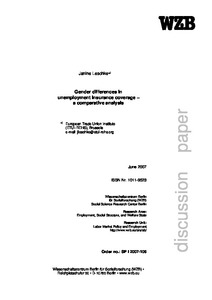Gender differences in unemployment insurance coverage - a comparative analysis
"Social insurance systems are known to reproduce gender inequalities in the labour market because they are usually based on "standard employment contracts" (full-time, permanent, dependent) and often take into account the household constellation through means-testing. Gender inequalit...
| Main Author: | |
|---|---|
| Institution: | ETUI-European Trade Union Institute |
| Format: | TEXT |
| Language: | English |
| Published: |
Berlin
2007
WZB |
| Subjects: | |
| Online Access: | https://www.labourline.org/KENTIKA-19189833124919070159-Gender-differences-in-unemploy.htm |
| _version_ | 1771659894305325056 |
|---|---|
| author | Leschke, Janine |
| author_facet | Leschke, Janine |
| collection | Library items |
| description | "Social insurance systems are known to reproduce gender inequalities in the labour market because they are usually based on "standard employment contracts" (full-time, permanent, dependent) and often take into account the household constellation through means-testing. Gender inequalities in the labour market consist of higher part-time employment rates, more frequent movements between employment and inactivity and on average lower wages among women. These inequalities are mainly due to the unequal distribution of household and family tasks between men and women. This paper will use the data of the European Household Panel to compare access to and level of unemployment benefits between men and women. Differences in access to benefits are usually brought about by the following design features of unemployment benefits: hours and earnings thresholds, minimum contribution requirements, and means-testing, whereas the benefit levels in many systems are calculated as a share of former earnings, and among long-term unemployed are also affected by means-testing. Since unemployment benefit systems of different countries strongly vary in their aims and design features, four countries are compared: Denmark, Germany, Spain and the United Kingdom. It is expected that gender differences in unemployment insurance outcomes will be smaller in countries that have more individualised unemployment systems (Denmark) than in countries that make early use of strict means-testing (United Kingdom) or that strongly rely on equivalence between contribution time, former earnings and benefit receipt (Germany, Spain)." |
| format | TEXT |
| geographic | Denmark Germany Spain United Kingdom |
| id | 19189833124919070159_9514a38f157c4cd7b23645b9fe1ea88f |
| institution | ETUI-European Trade Union Institute |
| is_hierarchy_id | 19189833124919070159_9514a38f157c4cd7b23645b9fe1ea88f |
| is_hierarchy_title | Gender differences in unemployment insurance coverage - a comparative analysis |
| language | English |
| physical | 41 p. Digital |
| publishDate | 2007 |
| publisher | Berlin WZB |
| spellingShingle | Leschke, Janine comparison employment gender statistics unemployment benefit Gender differences in unemployment insurance coverage - a comparative analysis |
| thumbnail | https://www.labourline.org/Image_prev.jpg?Archive=117954693513 |
| title | Gender differences in unemployment insurance coverage - a comparative analysis |
| topic | comparison employment gender statistics unemployment benefit |
| url | https://www.labourline.org/KENTIKA-19189833124919070159-Gender-differences-in-unemploy.htm |

